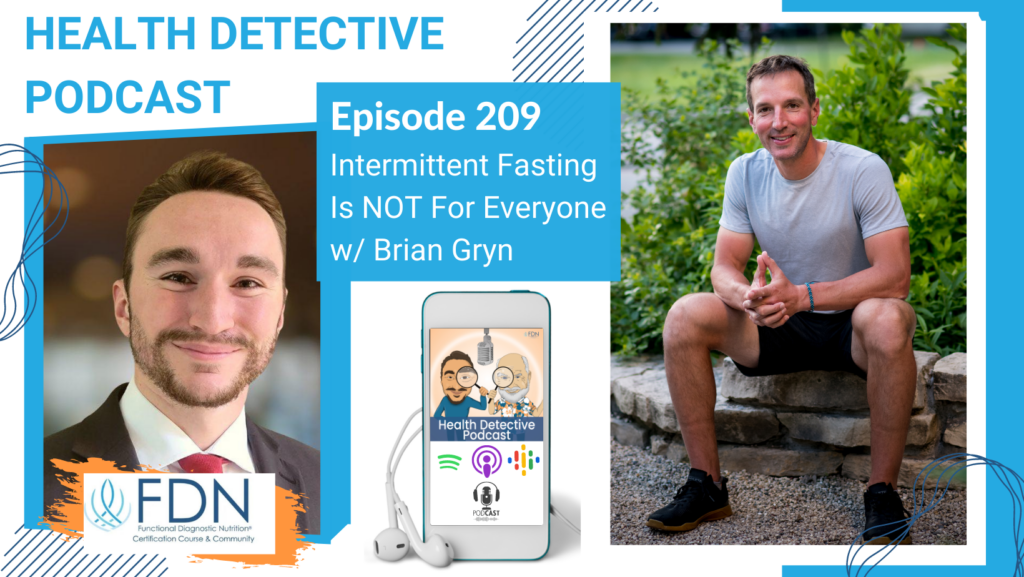Introduction
[00:00:00] Detective Ev: Hey guys, Evan Transue here, AKA Detective Ev. Welcome to the Health Detective Podcast. I’m looking forward to bringing you guys this episode today about intermittent fasting.

We are speaking with Brian Gryn. He is actually one month into the FDN course, although he is not new to the health space by any means. He’s actually been involved in it for almost 15 years, I believe it’s actually more than 15 years. He’s an intermittent fasting expert and he’s one of those rare people on our show that actually did not deal with some severe chronic health issues prior to getting into health. He was one of the ones that was smart enough, unlike myself for example, to actually be proactive with their health and get on top of it before it really hit the fan.
There’s plenty to learn here today. A lot of our audience is female, so this might be a great one to share with your significant other or husband if you have one. It could be a good one, I promise.
With that all said, I just wanted to thank you guys too because I haven’t thanked you in a while. We are at 73 perfect five-star reviews on Apple Podcast. I greatly appreciate this. I have told you before, my goal is to try to get to a hundred perfect five stars before we get a troll. I know it’s going to happen eventually; it is inevitable.
You know, you actually almost want some trolling because that proves that you’ve gotten big enough. But I think I can get to a hundred without any trolling. So, I just wanted to thank you guys for doing that. We do see it; we do appreciate it.
FDN Course Giveaways
If you are ever interested in trying the FDN course, maybe you’ve been listening for a while and you’re just like, all right, how can I actually go do this? You want to go to fdntraining.com/tryfdn. They actually allow you to try the FDN course completely for free nowadays. That’s fdntraining.com/tryfdn.
If you are more interested in just getting like a printed-out course curriculum where you can kind of see, this is exactly what I would learn. I don’t need to try the course, but I want to see the overview. We also have that. Just go to fdntraining.com/course. That’s fdntraining.com/course.
Making a Huge Shift with FDN
All right, here is today’s episode with Brian Gryn. Hello there Brian. Welcome to the Health Detective Podcast. How are you?
Brian Gryn: Great, how are you?
Detective Ev: I’m doing well, thank you.
This is one of those cool ones because we actually just recently had someone on the podcast, if you guys are listening, this would’ve been a few weeks ago now. Her name’s Dee Davidson and she was actually actively training in FDN when she came on the podcast. But that’s also because she had done some stuff prior to kind of getting into the world of FDN. So, we felt that it was relevant.
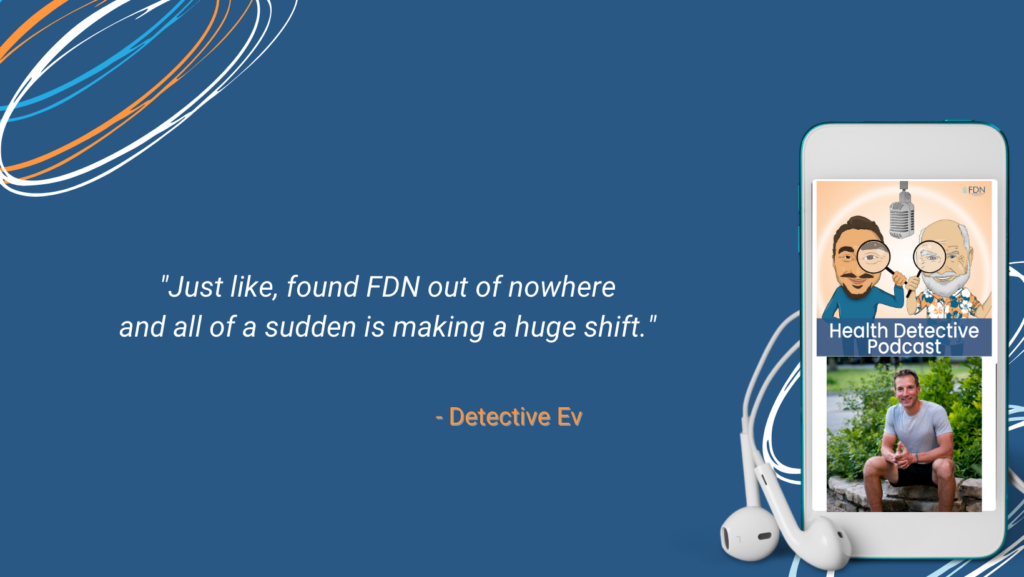
It’s kind of the same thing with Brian today, where this isn’t his first rodeo by any means. Just like, found FDN out of nowhere and all of a sudden is making a huge shift. You’ve been doing other things and other things have come up.
I’m also really interested to get to hear from someone who’s kind of newer to the course. Because, Dee, by the time she did this, she almost might as well have been graduated. She was on the practical side, she’s doing the testing, so she’s covered every module in the course. It’ll be interesting to get a perspective from someone who is still kind of going through the trenches.
But before we even get to that, what I’m always interested in, and the first question we always go to on this show, is kind of like what got people into this space. Maybe more specifically is what health symptoms did you deal with? Because no one really seems to get into the world of natural/alternative medicine without some type of story. Hardly anyone gets into FDN without it. What was going on for you, man?
Optimizing Health for Self and Others
[00:03:09] Brian Gryn: I was maybe one of the lucky few. I mean, I got into health pretty early on. I started studying it right out of college. I didn’t actually practice health right out of college, was in commercial lending and finance.
You know, you go to college, you study, you don’t even know what you’re going to do half the time. So, I did study finance. Also, in the back of my mind, I realized I wanted to get into health and wellness. I actually just started training individuals out of a studio, me and a couple other individuals who, I’m just outside Chicago.

Yeah. I just always was interested in strength training and enhancing other people’s lives through health and wellness. I would say there’s no huge story for me. I was always into health. I was never really overweight per se. But I did find as I got older, I’m 42, once you get past thirties and into your forties, you start to realize that the things that you were doing maybe early on aren’t working as well as they were when you were younger.
I think that sort of drove my interest even more. Sort of got me into a little bit of fasting, which I’m sure we’ll talk a little bit about. Also, just optimizing my health and being almost like a biohacker within the space. So, my story isn’t crazy, won’t take your breath away. But it was something that sort of drove me.
Then just helping others. I’ve had a lot of different individuals, men and women who came to me just to learn to get stronger. But then we also started getting into the weeds and focusing on nutrition and different lifestyle changes that they could make.
The Goal is Proactive Health
[00:04:27] Detective Ev: Works for me. I mean, that actually sounds like more of a classic FDN story. People don’t always know this, when FDN was founded as a course almost 14 years ago, if you actually talked to some of the first people that went through, many of them, almost like all of them were personal trainers. A lot were into actually body building and fitness even competing.
A lot of them were natural competitors. What they needed is every little edge that they could possibly get. They were tracking hormones and making sure like, when I’m competing what do my hormones look like? Right? Because obviously that profile for someone that is not using things is going to be pretty tanked in certain ways. They were able to kind of course correct and check, so that’s totally fine with me.
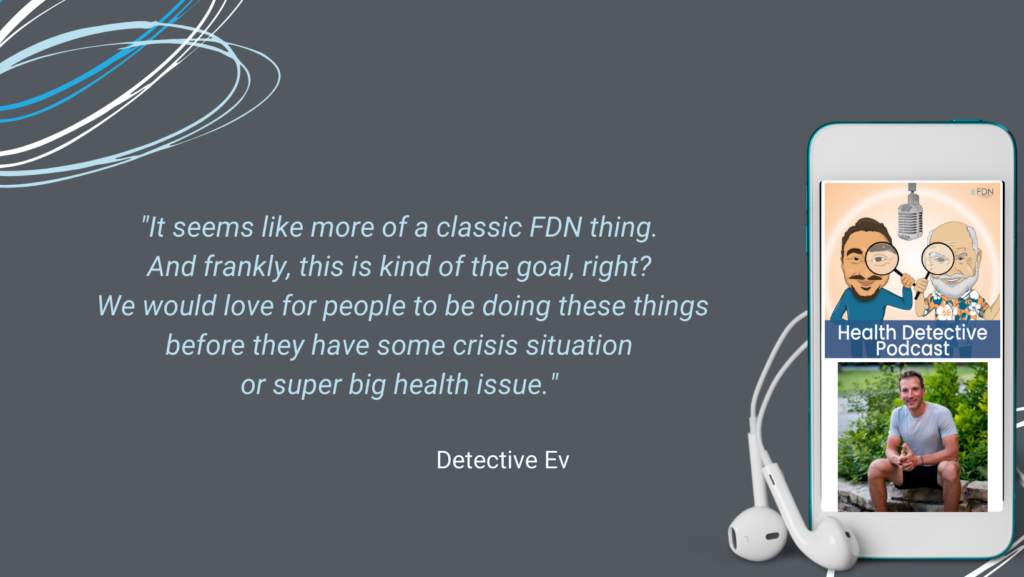
It seems like more of a classic FDN thing. And frankly, this is kind of the goal, right? We would love for people to be doing these things before they have some crisis situation or super big health issue. And yeah, you’re right, it might make for an interesting story. But the truth of the matter is even when I share my own stuff, like I wish I could have known these things years and years before so that I didn’t have to go through this.
I also like what you said, especially for our audience about once you kind of get into the thirties, you maybe see things not working the same way as they used to. Even for myself being 27, maybe it’s because I had the health issues for a while, I’m just starting to finally understand why certain people that I know in their fifties and sixties are out of shape.
Health Challenges As You Age
I had always wondered my whole life. I’ve never been like a varsity sports player or something like that.

But to me, I’m like, this just seems so simple. Why can’t we just do these things? But then Brian, one injury happens, or one little, small thing occurs. For example, I broke my foot four years ago. I didn’t run normally for almost three and a half, four years after that. I could see how most people would take that to the grave.
I just sprained my elbow. I cannot put any weight on it still, for the most part, like upper body-wise. I have to be very limited. You know what? Sometimes month or two months injuries that get you out of a habit, that turns into the rest of your life. So, I definitely see what you’re saying. We gotta maintain these things.
So, how did this evolve though? It’s one thing to be into strength training. I mean, that’s literally every other person my age on Instagram I feel like nowadays is into that. It’s one thing to be doing the strength training versus what you would even label as biohacking or the next level.
So how did it evolve into that?
Evolving and Tracking with Tests
[00:06:32] Brian Gryn: Well, that’s a good question. I think how it evolved is, like you mentioned, I found that I wasn’t getting the same results that I was getting when I was in my twenties, let’s just say. So, I think it just sort of drove my interest to learn more about health and wellness.
And I started tracking, I started doing blood testing. I actually got introduced to someone that was in FDN, Matt Terry. He went through the trainings. I don’t know if you know him, but he did a hair, mineral analysis for me, and I was really impressed with just his knowledge, what I learned from that one consultation. We just started talking, we’ve become friends, and he’s helped me since till today.
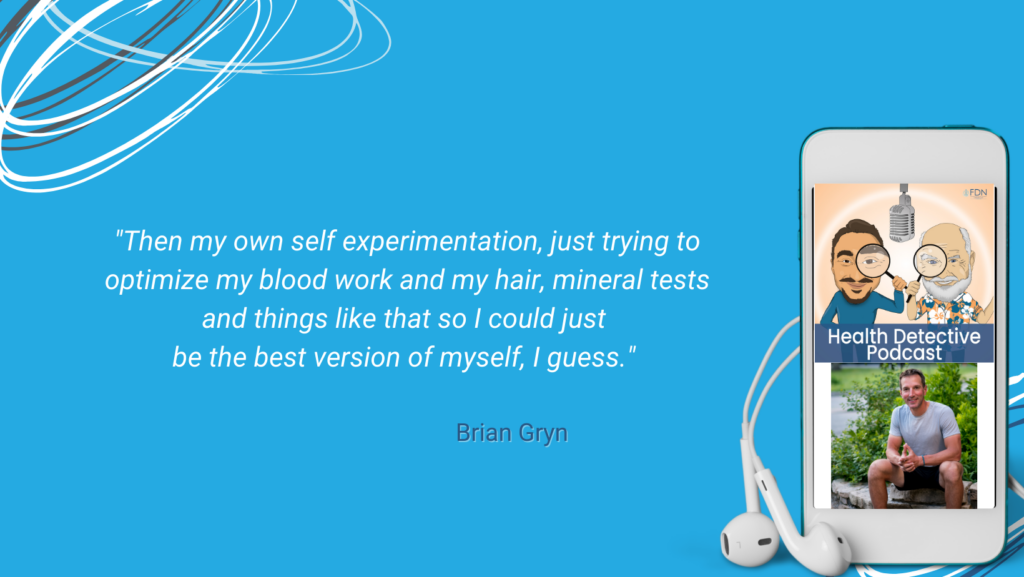
So, I guess meeting someone else that was in bodybuilding. He might have done it professionally for a while. I guess it was just meeting him definitely drove my interest even more, especially into FDN. Then my own self experimentation, just trying to optimize my blood work and my hair, mineral tests and things like that so I could just be the best version of myself, I guess.
[00:07:24] Detective Ev: That makes so much sense, the connection to Matt Terry. He’s actually been on I think a couple of times, at least once for sure. Matt would be so good, I feel like, at bringing this to someone who isn’t into maybe like the little potions and lotions that come with like, homeopathy.
Pinpointing the FDN Decision
I’m not making fun of it. I’m just saying clearly, obviously, women seem to be more attracted to that. If you’re like a sports guy, I mean, Matt’s going to be the dude. You know, like that’s the dude that’s going to convince you that this is a really good thing to be doing or utilizing. Man, he’s just an amazing person with how routine he is and just structured and getting stuff done.

So, you ran those tests and then when did you decide okay, I’m going to start actually wanting to do this for other people. Because I mean, FDN sounds relatively recent, and the strength training was a whole part of your life. Maybe you were doing the finance stuff and studying that, but you kind of clearly had this passion or interest in this thing for a couple of decades, at least at this point. But even, again, implementing it for ourselves versus implementing it for others, I still consider that a completely different thing.
I guess I’m just trying to really dial into the true moment here where it’s like, now I’m going to go do this. I’m going to actually help others with this. I’m going to pursue something like FDN. I mean, is it really just as simple as that desire to keep constantly growing and learning because that would make sense? Or is there something specific you’re trying to achieve for others now?
The Missing Piece of the Puzzle
[00:08:34] Brian Gryn: Yeah, I mean that was part of it. I think when I was strength training and then helping others get stronger in this small studio, people would ask me different questions about diet, lifestyle. I would give them what I thought was a good answer. But from there, that sort of led to me saying, you know what, maybe I need to educate myself even more and just create a better product for that individual to help them get to their goals.
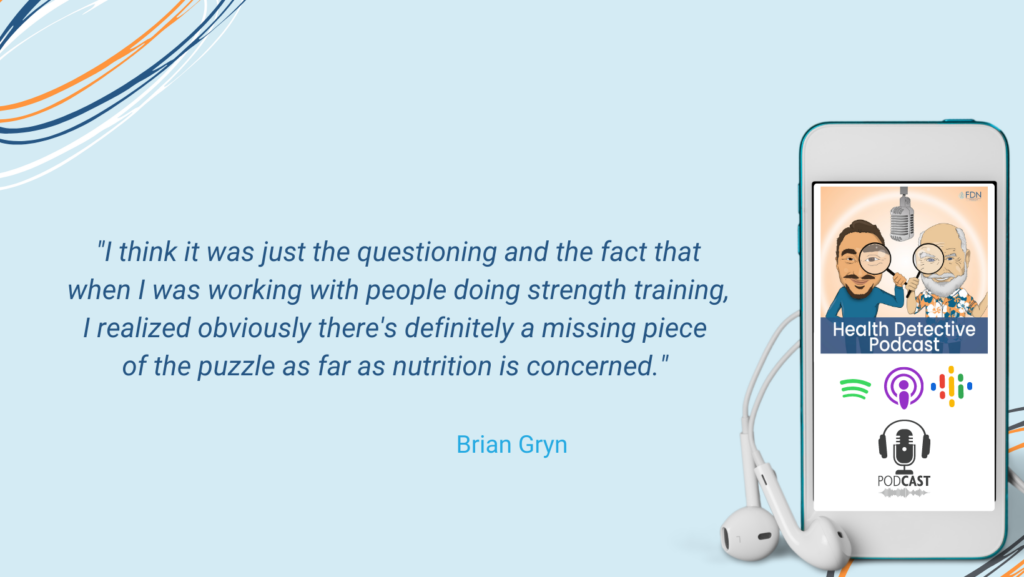
I think it was just the questioning and the fact that when I was working with people doing strength training, I realized obviously there’s definitely a missing piece of the puzzle as far as nutrition is concerned. Just optimizing that end of it and lifestyle, other lifestyle changes like stress, dealing with stress, and sleep and things like that.
Then also starting a podcast cause I do have a podcast of my own. You start interviewing a lot of different people from all different walks of life and that sort of led to my interest as well through just meeting other people in this space.
[00:09:21] Detective Ev: Actually, this is a good time to mention the podcast as well.
What is it at the time of recording this? You know, we’re about a month into the FDN training program, but what is it that you do currently today then between the podcast, currently working with people? I’d love to start there.
A 6-Month Program for 45+ Year Old Men
[00:09:36] Brian Gryn: The podcast is Get Lean, Eat Clean and has been going for a couple years now interviewing health experts from around the world. My main thing is helping people who are in their forties and beyond, trying to get their body/mind back to what it was when they were maybe in their twenties and thirties. That’s the whole premise around the podcast.

My work is mainly done with males, I’d say, 45 years and older. That’s been sort of my niche. I’ve created a six-month program that I work with individuals. We just work on everything from creating clarity all the way down to nutrition, meal timing, sleep, stress, you name it, activity upgrades. I created sort of a six-step system for my clients and that’s been my main niche.
[00:10:19] Detective Ev: I love that there’s someone actually focusing on this. I mean, I’ve talked to well over a hundred people on this podcast, and it is not only rare, I’m trying to think if I’ve ever heard of someone say that their target person is actually someone who’s a 45-year-old plus male. It’s an underserved community and half of the time I think it’s because us dudes are sometimes a little reluctant to get involved.
Do you find, or have you found at least, was there resistance with people in the beginning or how did you package this? I don’t necessarily mean that so literally, I’m talking in terms of marketing. But how is this packaged or sold to convince 45-year-old men who are sometimes like very tough, not going to talk about anything they’re struggling with, to start utilizing some of these more advanced health habits? How do you pitch that to them and what are they interested in?
Realizing Help is Needed
[00:11:01] Brian Gryn: I started, first, a lot with more market and just reaching out. I think a lot of times, like you mentioned, maybe males don’t want to admit that they need help. But once you build a relationship and they have trust and know what you do and see your habits, then it could be a simple question as if they’re looking to optimize or change or get their health back in order.
A lot of times it’s just a simple question and then it’s really not me trying to convince them, cause I really don’t want to do that. I know that’s the wrong person if I’m trying to convince them. They have to come to this conclusion in their mind but realize that I’m there to help them.
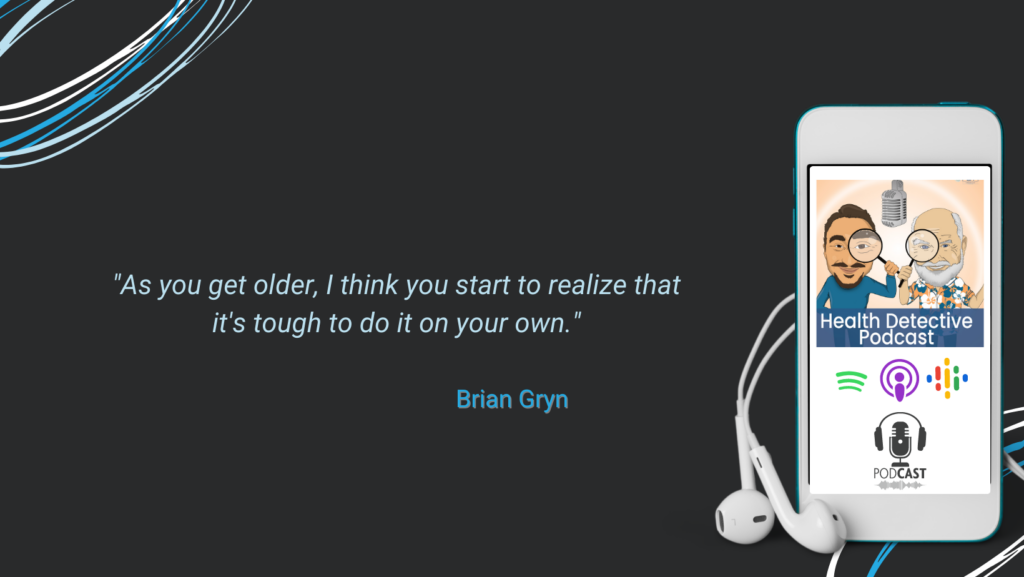
As you get older, I think you start to realize that it’s tough to do it on your own. You know, I have coaches in other areas of my life that I do need help, in business and things like that, that have guided me. I think most individuals that I’ve worked with understand that doing it on their own hasn’t worked for the last 30 years. So, it’s time to maybe find someone that’s going to hold me accountable and help them through the process.
[00:11:54] Detective Ev: So, you can teach an older gentleman some new tricks once they realize it’s not working after all that time. I think maybe that’s the plus side of this. Because I know, again, it’s like a premature glimpse of it being in my late twenties. But I’m like, okay, wow. Like this is part of your identity as a guy, right? You want to be strong; you want to be fit; you want to be fast.
The Intermittent Fasting Train
And I get that eventually you’re just going to age, that is what happens, right? Of course, you can’t live forever. But you don’t want to accelerate that any faster than it needs to happen.
Because I have seen, especially like when I go to the local gyms, you can really tell the men and women that were into this before this was like a huge thing on the internet. Cause there are 55-year-olds there and they are fit man. They could kick my butt if they wanted to because they never stopped. They stayed on track, they didn’t do a bunch of risky activities like one rep maxing every other day, right? Like, they’re probably doing more controlled stuff to keep themselves injury free, or at least minimal injuries throughout their life.
I see that and I’m like, I want that, I know I can do this. I’m thinking, man, 55, for example, will be 28 years from now. I’m like, that’s basically double your life. I’m like, dude, if you just stay even half consistent that whole time, you can achieve things like that. But many people fall off.

Now, one of the things we were inevitably going to get to today, and it’s something I’m fascinated with, is you have an expertise in the intermittent fasting thing. I think this really resonates with males of all age. It’s amazing actually how some of the only health habits I’ve been able to get older men in my life to change, is I can get them on the intermittent fasting train. They think it’s interesting and they find it almost natural, which I think there’s many reasons for that.
Do you recall at what point did you start maybe learning about that or following an intermittent fasting schedule?
Intermittent Fasting as a Tool to Help Others
[00:13:33] Brian Gryn: I remember learning about fasting actually from a client of mine. She was a woman who was pre-diabetic having some issues. She was just going down the rabbit hole of, you know, what can I do? She came on to fasting and really had great results. That sort of led me to learn more about it.
I just started experimenting on myself cause I like to do that. For the last, at least eight years, I’ve been doing it to some degree. My thought process on fasting has changed a little bit over the years. If you talk to a lot of people in the health business or in health coaching, I’m sure something that they thought 10 years ago is a little bit different than what they think right now.
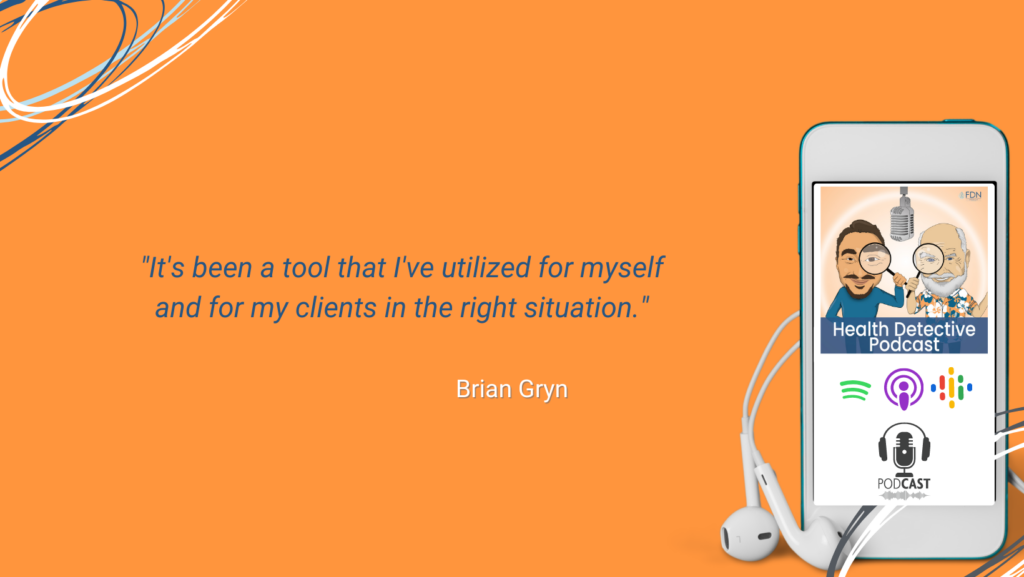
It’s been a tool that I’ve utilized for myself and for my clients in the right situation. So, it was actually brought to me sort of through a client of mine initially.
[00:14:17] Detective Ev: I agree with that. I stand pretty strongly that there’s some certain truth, right? Generally speaking, without going into all the nuances of how they’re adding stuff to the water, water’s probably going to be better than soda. Whole foods are probably going to be better than the package stuff, right? You know, sleeping around nighttime is probably going to be better than sleeping in the middle of the day. But outside of that, you are right.
There’s very specific circumstances, there’s unique needs that come up for people in today’s world where they might have chronic illness for a variety of reasons, and a minimal amount of fasting can be too stressful on the body. Right? So, we need to dial back for a little bit.
Intermittent Fasting Is a Stressor
You’ve been doing it for eight years. I got into that maybe like five and a half, six years ago myself, if that. I feel like it’s heard about so much. So, you were kind of one of, in my opinion, like an early adopter to this because now it’s like every other person recommends it and there’s entire YouTube channels dedicated to it. But, you know, when I was doing this, it was kind of weird. Again, you have two, three years on me.
A lot of people around me were like, what? You’re just not going to eat? It’s like, well, no, I only don’t eat for this amount of time. They’re like, so you can eat the same amount of food. Well, in my world, in the way that I was doing it, yeah, I can do that. Like, okay, cool. Ev’s just doing another one of his experiments.
So, knowing that your perspective has evolved over these last 10 years, like you said, or eight years, where is this at now? Like I’m assuming you’re not someone who just blanket recommends the same intermittent fasting schedule to everyone. So, where do some nuances come in with the intermittent fasting thing?
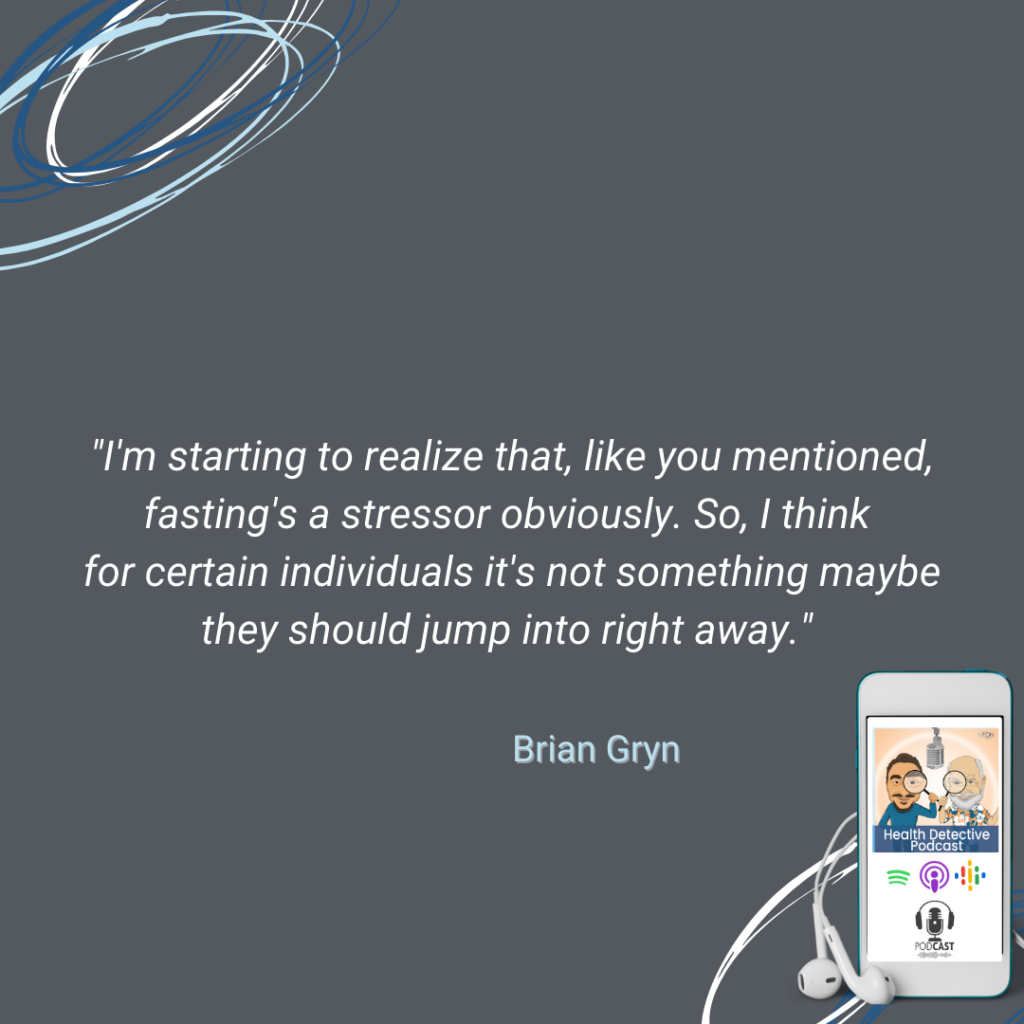
[00:15:35] Brian Gryn: Yes, correct. I think when I first started, I was a little more stringent. I’m starting to realize that, like you mentioned, fasting’s a stressor obviously. So, I think for certain individuals it’s not something maybe they should jump into right away. They should maybe focus on certain other areas of their health that maybe need more attention. So yeah, it’s not sort of this blanket, okay, everyone should just fast.
Utilize Intermittent Fasting According to Individual’s Needs
I mean, I think that the big thing that fasting does is it gives you boundaries around your day. For some people they really need that.
That could be as simple as just picking a time to stop eating. Like, okay, I’m going to cut off eating at seven o’clock and that’s it. You know, that gives you sort of this cascade of results in the sense that like, okay, I’m not eating too close to bed, which is good, right? That’ll help with digestion and that’ll probably help with quality of sleep.
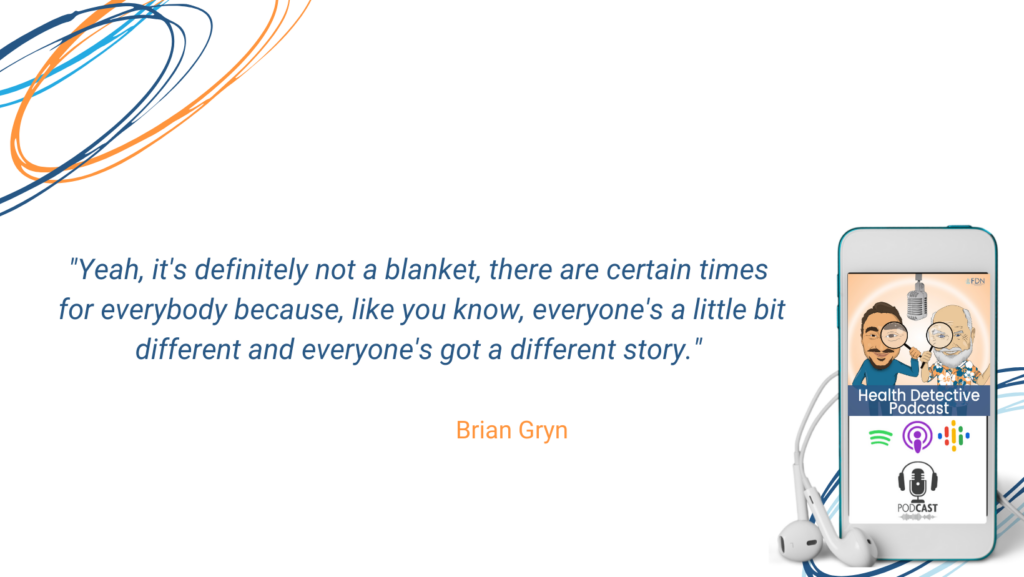
So, I try to look for those big levers to pull that will create these cascading of positive effects on the individual, and that’s one of them. Yeah, it’s definitely not a blanket, there are certain times for everybody because, like you know, everyone’s a little bit different and everyone’s got a different story. That’s sort of how I’ve probably evolved over the years when it comes to fasting.
[00:16:39] Detective Ev: Okay. And maybe this doesn’t matter as much because now you are targeting mostly those 45-year-old plus men. If nothing else, maybe it’s just anecdotal right now, but I have seen universally that men will do better and can survive on a tighter window with fasting than women. I think probably evolutionary speaking, there’s many reasons for that. I believe that can make sense.
I’ve also noticed sometimes, not always, but sometimes men even do better on like the carnivore thing than women. Again, I think there’s many reasons for that.
Making Simple and Timely Changes with Intermittent Fasting
How do you make the decision basically with your clients, then? What do we even start with?
I mean, I know we’ll probably look at their health. I’m sorry, not just generally blanket statement “their health”. I meant like health, sleep, other factors. I didn’t mean it so simply. Like is there a time where you’re just like, hey dude, we’re not doing this at all for at least a little bit. Or do you always try to tighten it to some degree?
Technically one can argue that a 12-hour/12-hour schedule is, unfortunately, in America some form of intermittent fasting, right? Like that really is intermittent. So, is there a baseline? Or are there certain times you’re just like, all right, we won’t even touch this yet until we get to the next level.
[00:17:40] Brian Gryn: Yeah. First and foremost, I’ll probably learn about their habits and what they’ve been doing for the last however many years. If something keeps popping up and let’s say, for example, an individual has issues with sleep. That’ll probably be the first thing we’ll really focus on, and I won’t really even dive into the fasting part.
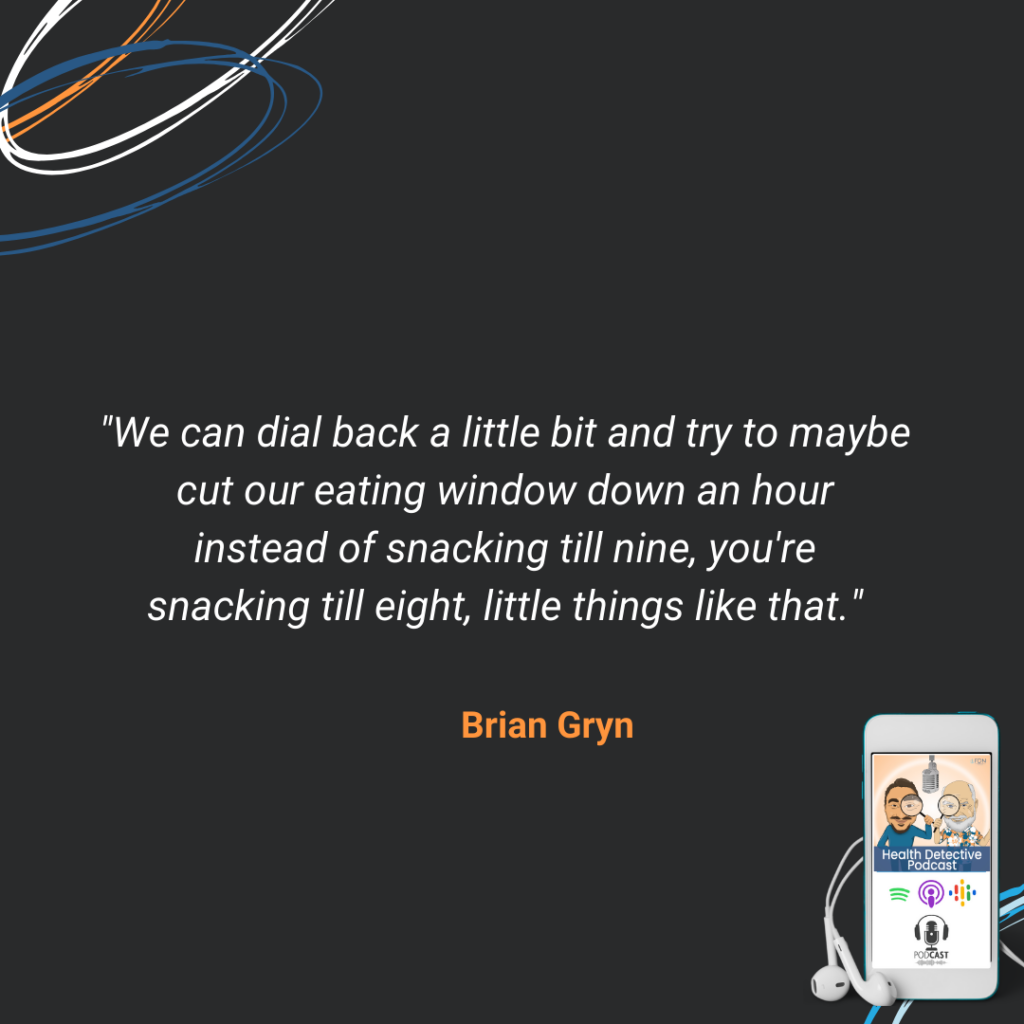
But like I said before, if they’re dealing with sleep issues and we find that they’re eating too close to bed, well there we go. We can dial back a little bit and try to maybe cut our eating window down an hour instead of snacking till nine, you’re snacking till eight, little things like that.
Intermittent Fasting Was Natural in the Wild
Another standpoint is too, like I mentioned, snacking is a big one, right? I have nothing wrong with someone who wants to have three solid meals, but let’s maybe eliminate the snacking and start from there. I mean, everyone sort of comes from a different place. And depending on an individual, we’ll sort of tailor to them, what they’ve done in the past.
[00:18:30] Detective Ev: Well, and Brian, this is something that people don’t think about, right? Because when we’re talking about snacking, it’s like people, I think initially wonder when they hear this, like is that really that big of a deal?
But the problem is, if you think about what we most likely would’ve been doing in the wild, it’s like we kind of had these instances of working hard and then feasting, working hard and then feasting. It’s not like you were just walking around and able to go off this shelf, and the kitchen here, and then your friend’s kitchen, and then the grocery store, and then the Starbucks. It didn’t really work like that.
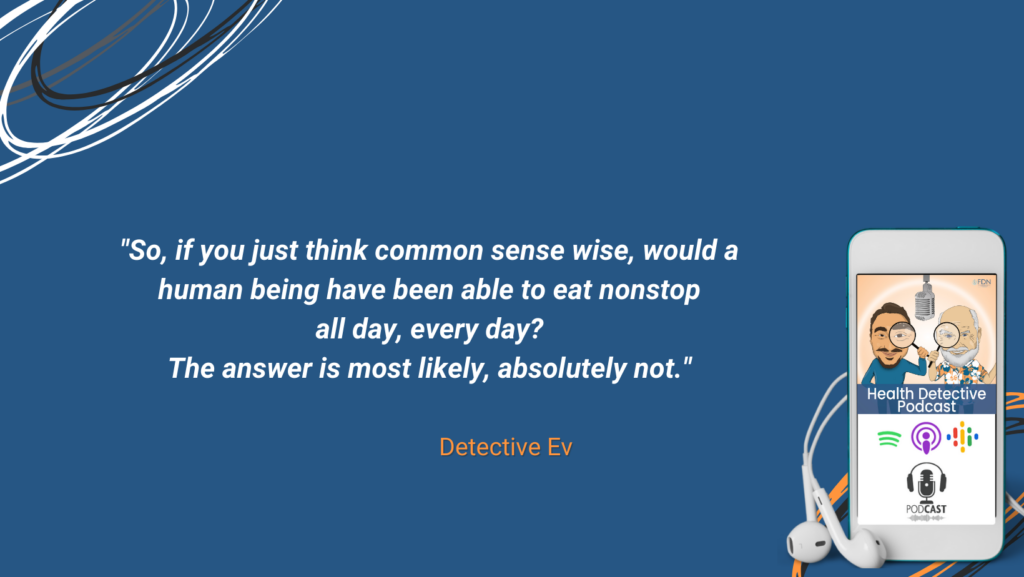
So, if you just think common sense wise, would a human being have been able to eat nonstop all day, every day? The answer is most likely, absolutely not. I think this is just consistent with common sense that we were probably designed or evolved in such a way that you need to have these little gaps in between eating.
Now, this is what’s so tough about, I mean, it’s a bigger concept, but the world of functional medicine in general and natural health is you almost have to accept the idea that anything that we are doing that is not in alignment with our ancestors is subject to being harmful. That doesn’t mean it’s automatically harmful.
Intermittent Fasting: Pick Small, Little Wins Quickly
Even you and I are right now sitting in a 90-degree position in these chairs. That’s technically not ideal, right? But people wouldn’t have thought about that. They’re like, oh, cool, we can relax more. That’s not always the case.
So, do the guys that you’re working with, do they get that initially? Like, okay, you wouldn’t really be able to snack all the time, that’s why we need to go to these meals. Are they like, it’s not such a big deal if I have a little cream in my coffee?
[00:19:53] Brian Gryn: Well, you make a lot of good points. Looking ancestrally is not a bad way to identify certain things and habits that we’ve grown to as humans and sort of that are creating this obesity epidemic. On the other hand, ancestrally too, they didn’t have a lot of the things that we have today.
I think there’s nothing wrong with comparing us to what we used to do, but on the other hand, you gotta sort of bring it to people to today’s life and what can they do? Like you said, there’s a Starbucks on every corner. They can, on their phone, have a meal delivered, a smoothie delivered in probably about 10 minutes, maybe. Some of this can be good stuff, some of it obviously is not.
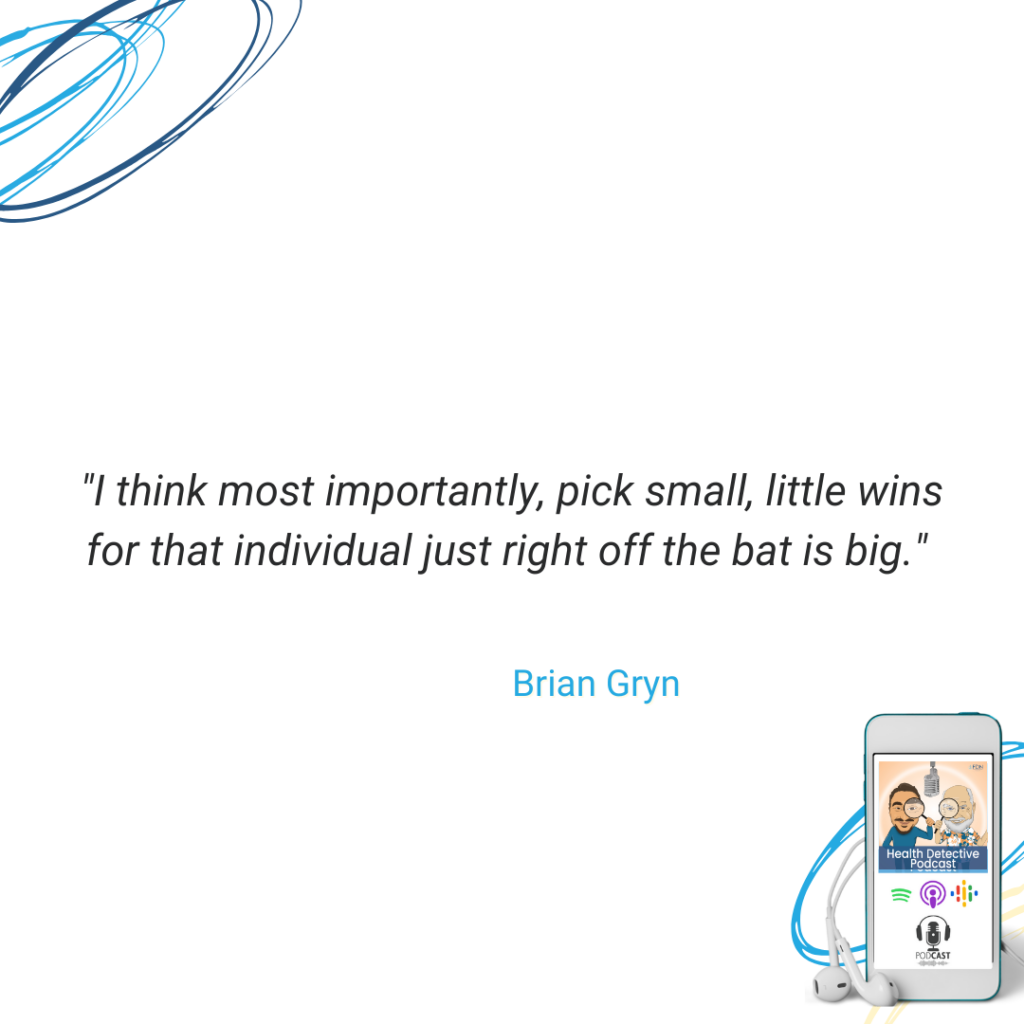
I think most importantly, pick small, little wins for that individual just right off the bat is big. Like you mentioned, sitting here talking, being surrounded by 5G and the environment that we’re in right now, you know, that can cause a lot of issues as well. So, some of it we can avoid and some of it it’s very difficult to avoid.
Ease Your Way into Intermittent Fasting
[00:20:46] Detective Ev: Sure. So, if someone’s listening, now that we’ve properly disclaimed this probably more than was even necessary on my part, we’ve stated clearly that it’s not a one size fits all for everyone, there’s little things that can come up that might lead someone to being able to jump right into fasting in a decent schedule.
I know people that respond phenomenally to a 20 hour fast, four hours of eating. They love it and are thriving off of it. Some people I know have been doing this for a couple of years. I’m not recommending that. So, if someone’s listening and they’re like, all right, maybe I want to start this. They’ve heard this for a while, they want to pull the trigger on and then give the intermittent fasting a shot. Especially knowing that a lot of our audience is women, Brian, what is your advice for someone that wants to kind of give this a try and start it out?
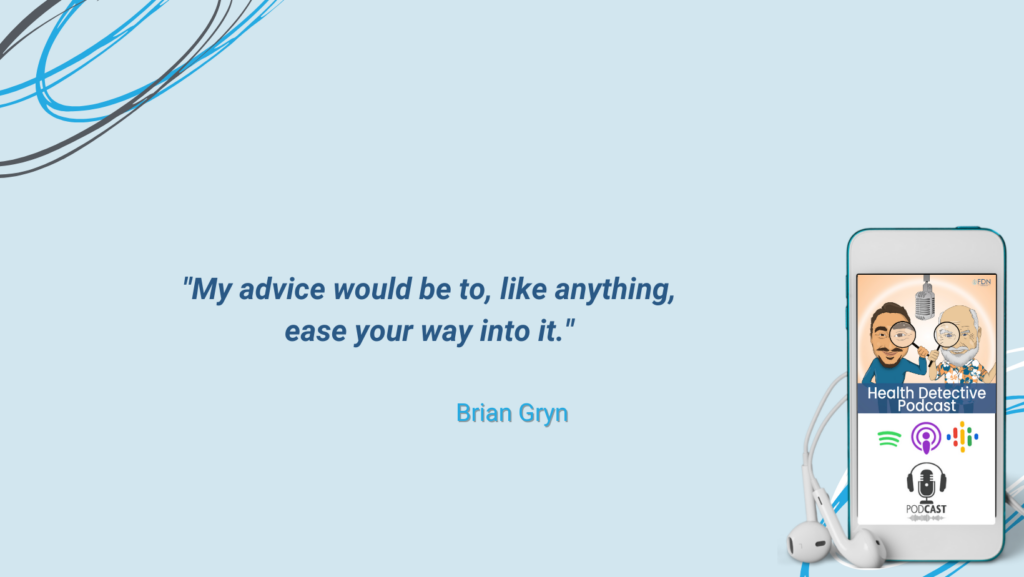
[00:21:24] Brian Gryn: My advice would be to, like anything, ease your way into it. That could be, like we mentioned, if you find that you’re eating later in the evening, perhaps just dial it back an hour and then go from there.
I mean, when I first started doing fasting and was initially just cutting out that first meal of the day, I just gradually pushed it. I didn’t jump right to even noon right away. I think that’s important whatever the goal. And I’ll say this, if you want to sort of shrink your eating window, I do think it’s important to make sure that eating window is big enough that you can get enough calories in, enough protein in.
Intermittent Fasting: Focus on Vulnerabilities or Distresses
You know, I work with a lot of middle-aged individuals, you know, 40, 50, 60, 70, where maintaining muscle is important, avoiding sarcopenia is important. And if you’re not getting enough of nutrients in, then you probably need a better window.
Having a three-hour window, I think, is tough for a lot of people. So, I would say to anybody, ease your way into it. Maybe if you want to cut a meal out, that’s fine. If you find that meal is not working for you and you’re eating a lot of processed food. That’s why I like breakfast. I feel like it’s one of those things that people eat, they’re on the go and it’s a lot of croissants and bagels and things that are highly processed and not really helping them in their health journey.
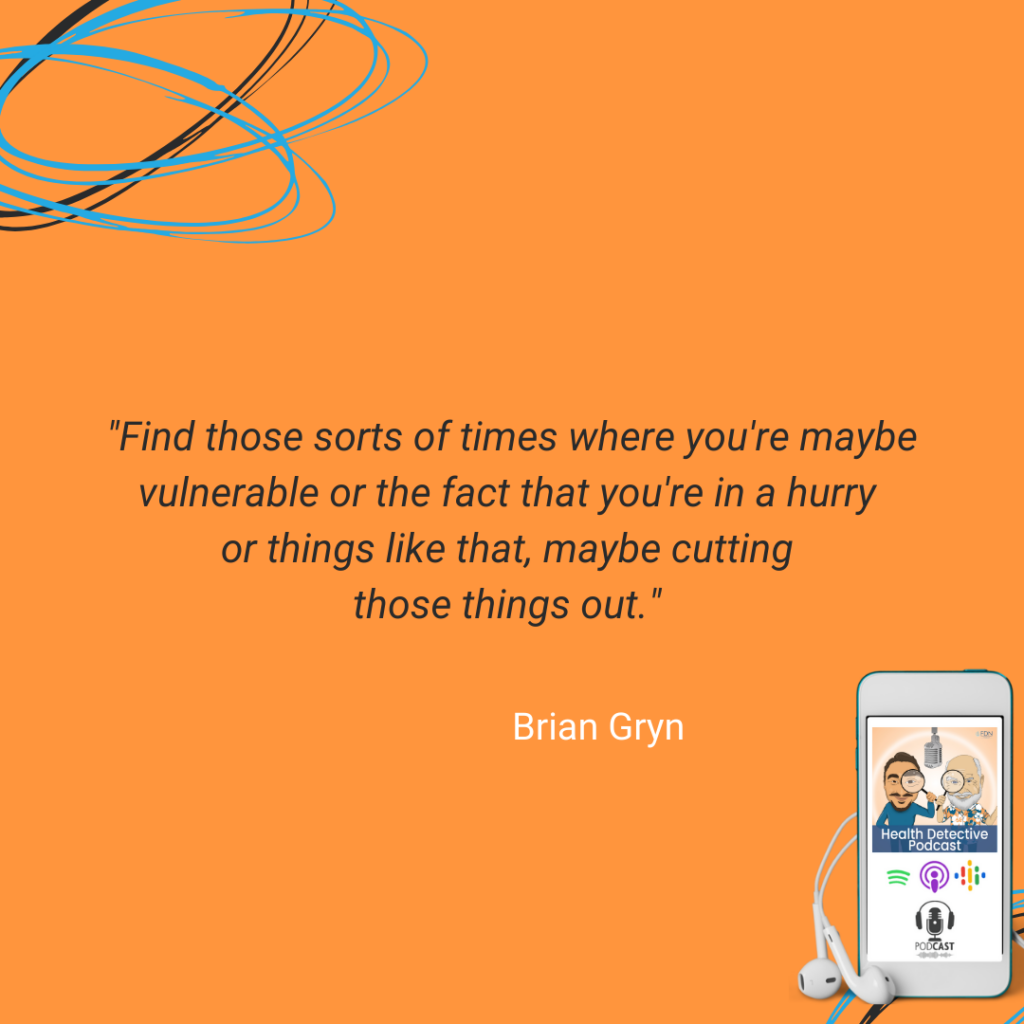
From that standpoint and the fact that that late night snacking, most people aren’t snacking on like liver bites, you know. Find those sorts of times where you’re maybe vulnerable or the fact that you’re in a hurry or things like that, maybe cutting those things out. Keeping your window, your eating window, away from those times can be really beneficial.
[00:22:53] Detective Ev: Yeah, and I appreciate that perspective. Because I think it’s so clear if we just look around at people, everyone’s created a little differently, they’re built a little differently.
I mean, as sick as I have gotten, the one thing that has never happened to me is I don’t gain excess weight. I mean, even in my late twenties, like I still burn through this stuff faster than anyone that I know. So, a 20-hour fast with four hour eating window, might not even be necessary for me.
Intermittent Fasting: Pick and Choose Your Battles
I still make mistakes myself. Just as recent as the last two years, I was in a super busy work schedule. In my head I know I shouldn’t be eating this close to dinner. I don’t really want to eat this soon after waking up. So, Brian, I was being stupid. I’d work all day. But I had this in my head that I really shouldn’t eat this close to bed, so I’ll just fast it off.
This is where you gotta adapt, what you were saying is brilliant, to the modern world. We gotta recognize that, yes, our ancestors did certain things, but we also live in this 2023 world.
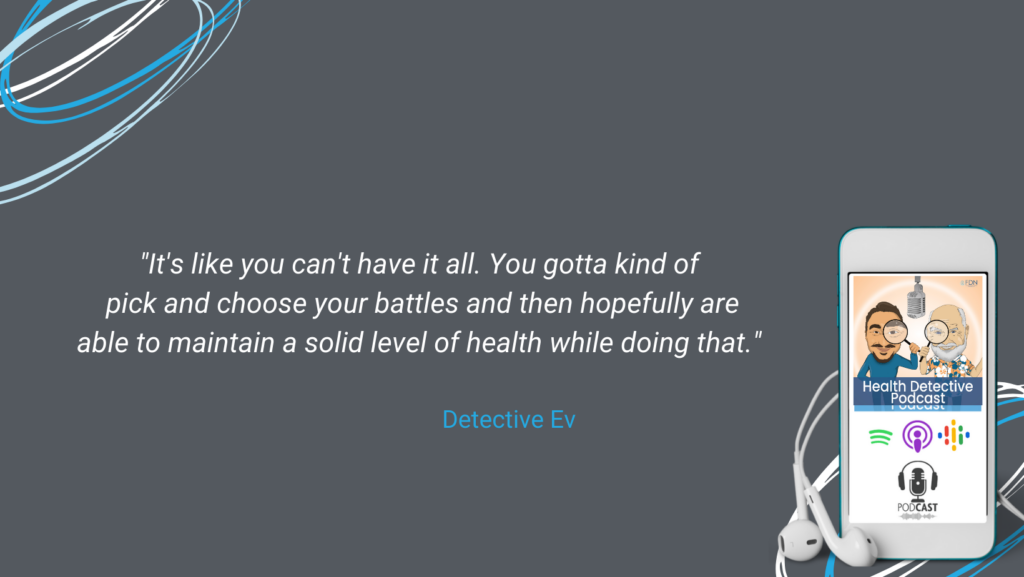
Not eating at all whiles expending a ton of energy, maybe the optimal habit is to not eat an hour before bed, sure. But if it’s the difference between, I’m literally malnourished now versus, okay, I ate an hour before bed. Probably in that case I was a little bit better off if I’m going to subscribe to that work schedule, which I chose to do. It’s like you can’t have it all. You gotta kind of pick and choose your battles and then hopefully are able to maintain a solid level of health while doing that.
One of the things that I know people are worried about, especially our female listeners, is the idea that when someone is too sick, since fasting is a stress on the body, it could lead to hormonal issues. Then you’ll hear the exact flip side of the coin where people swear that it is terrific for your hormones. I’m sure it’s situational, but what are some of the known benefits for the hormone perspective? I feel like it could be really cool, especially for men.
Intermittent Fasting Benefits
[00:24:37] Brian Gryn: Like your example, if you’re in a stressed state a lot, and you talk about this in FDN as I’m learning, these stress cascades can happen.
Working out is a stress, right? Not getting enough sleep is a stress. And if you’re also fasting, you’re driving these stress hormones. This could drive fat storage and slow metabolism. I think, like you said, you have to decide if you’re in this stress environment, do you want to stack something else onto that? I think you’re better off getting those things under control, sleep, stress, other things, before you start putting another stressor onto the body.
But back to your question, I think one of the biggest things, hormonally, you’ll hear different things regarding fasting. Think here about cell cleansing, autophagy and things like that. One of the big things, I think, that makes fasting effective for a lot of people is actually gut health.
I think the benefits of fasting from like just the gut relief of not having to digest anything. A lot of people are inefficient at digesting carbs per se, so like giving yourself that gut relief. Because as you know, and they talk about in FDN, endotoxin also known as LPS, is something that’s prevalent and could lead to something called sepsis. This is driving a lot of death in the United States.
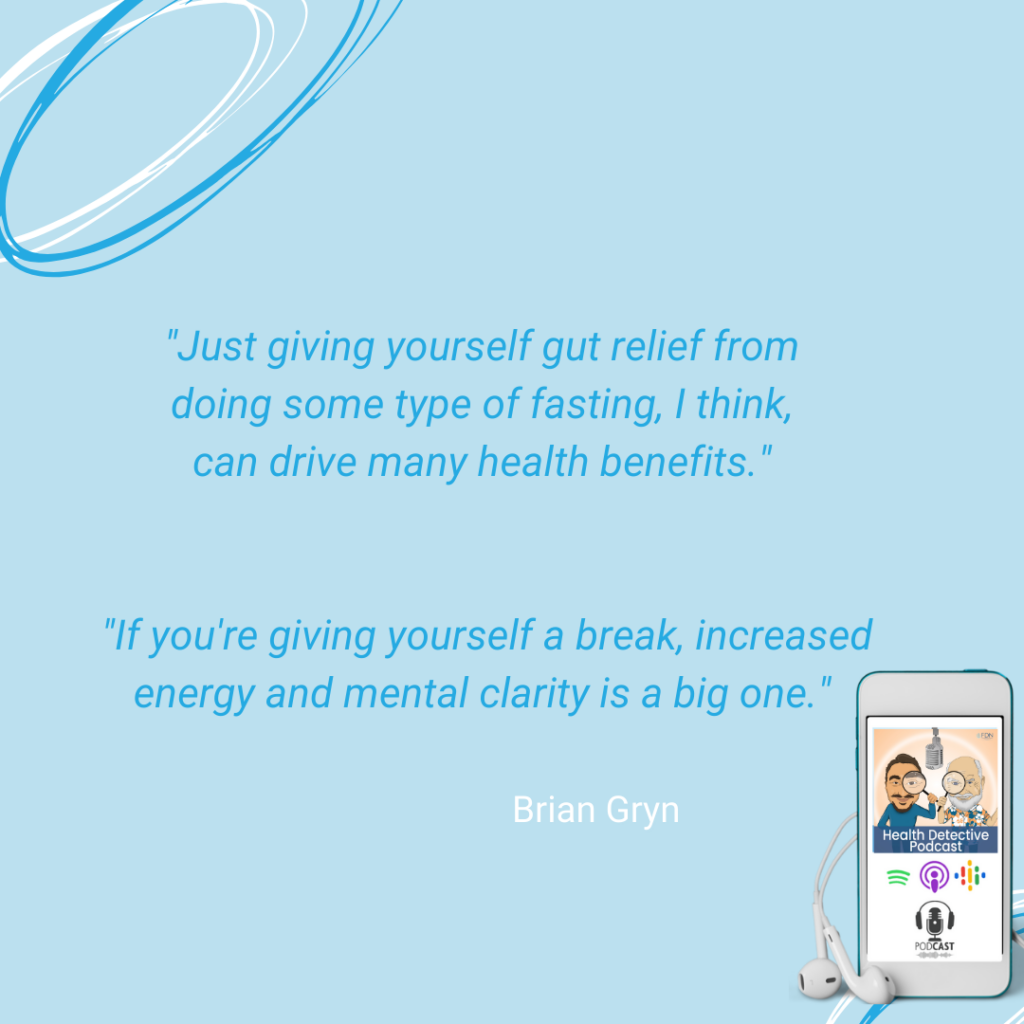
So, just giving yourself gut relief from doing some type of fasting, I think, can drive many health benefits. That’s probably the biggest one. But, a lot of people, obviously energy, you know, your body puts in a lot of energy to digest foods. So, if you’re giving yourself a break, increased energy and mental clarity is a big one.
Intermittent Fasting: A Balancing Act of Stress
[00:26:12] Detective Ev: Yeah. I wanted to, if we can, like dive even more into the hormonal side. I can’t reference them off the top of my head, but I’ve heard of certain things with like growth hormone and things like that. Again, assuming that we disclaim the situational thing that, yes, someone that’s sleeping four hours a night should probably not be doing extreme intermittent fasting. FDN kind of taught us this whether directly or indirectly, I think it’s more indirectly, but that life is a balancing act of stress.
I love working 70, 80 hours a week. I can do that, but I better be tight with everything else. I don’t mess with the sleep; I don’t mess with the diet. I don’t have toxic relationships. If I do add any of those things in too, my body gets destroyed because I’m choosing that 70-hour week stress. Versus if I worked 30, 40 hours a week, yeah, I could probably eat a lot more crappy food.
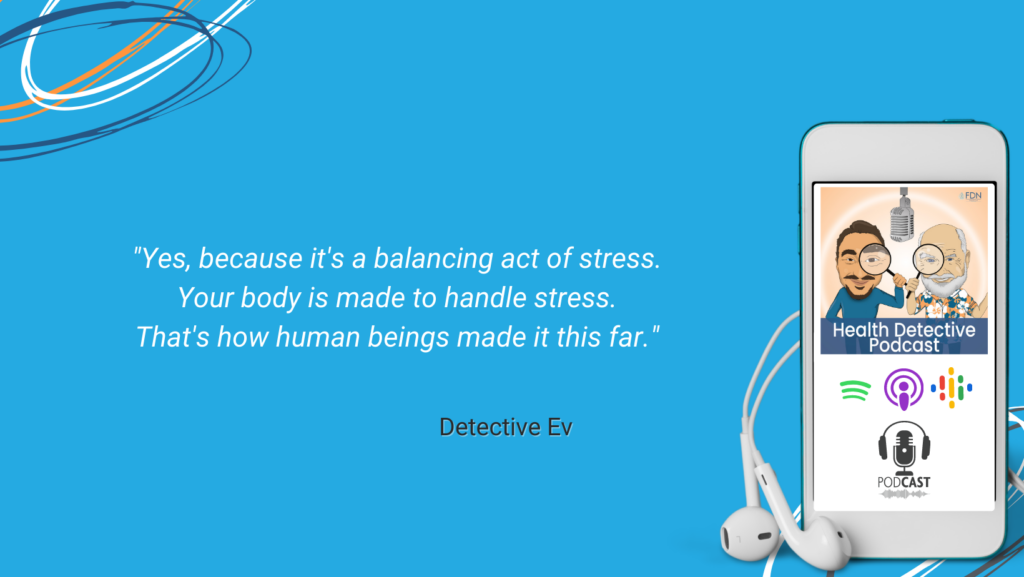
I don’t think this sounds, maybe not in our space, but to a lot of people, that sounds unbelievable. You’re telling me I could eat crappier food by working less? Yes, because it’s a balancing act of stress. Your body is made to handle stress. That’s how human beings made it this far.
So, it’s where are you going to choose it? What do you love more? Do you love the cake more than work? I love work. So, to me, I’d rather put it into that and be tight on the other things. For me, again, that’s stress. So, I gotta be careful with the hormonal things from that perspective.
Intermittent Fasting: Increase in HGH?
Assuming that we’ve already disclaimed all the bad stuff, I’m more curious about the benefits hormonally that can happen, especially like maybe even in that growth hormone thing, if you’re familiar with that, which I’m assuming you are, or the other things that you’ve come across study-wise.
[00:27:33] Brian Gryn: Yeah. I mean there are studies showing fasting increasing growth hormone. There was one I was actually pulling up that was done in like 1988.

They studied fasting and HGH, showing, I think, the increase was 300% and this was on a five-day fast. I don’t really recommend that for individuals. But also, there’s some literature around the fact that there are benefits to fasting and if it’s a little bit of a long term fast for an individual. But there are studies showing that also just a good hour of intense exercise, you can get those same cell benefits that you got from doing fasting for a little bit.
I think you have to sort of balance. I just had on my podcast, Brad Kerns. He referenced this study. There has been showing that fasting can be a stimulus to HGH secretion. There was another study showing there could be a fivefold increase in HGH in response to a two-day fast. But you sort of have to balance and see what your goals are.
I don’t think that’s necessarily a reason just to do fasting because a lot of these studies are done over like more extended fasts. I think that’s probably unrealistic for a lot of people to do, cause that that could be a little bit too much. Either way, yes, there are studies showing that.
Intermittent Fasting: Extended Fasting
[00:28:40] Detective Ev: Yeah. And the extended fast, it’s a whole separate podcast. I have done 72-hour water fasts. To me, this is not medical advice, so don’t go copy us out there. But I actually consider it’s one of the things that allows me to live probably the most stress-free life in terms of the mental stress.
The downside of being as aware as we are, is that we are aware as we are. We’re thinking about the 5G, we’re thinking about the lights, we’re thinking about the sitting, like it can get overwhelming almost. Then it’s ironic because the stress of thinking about all these things sometimes can be worse than the things themselves.
What is calm to me most is the studies and the miracle stories I have heard around fasting. I believe that’s my biggest tool. Like there is almost nothing I’m afraid of. It’s also because I check my health status so often, to be clear. I’m not saying if I was randomly getting diagnosed with a terminal level cancer, that I would go on a seven-day extended fast. I mean, that could actually be too much on the body at that point. There’s studies showing that the cancer cells can actually override autophagy, so that’s a separate conversation and beside the point.
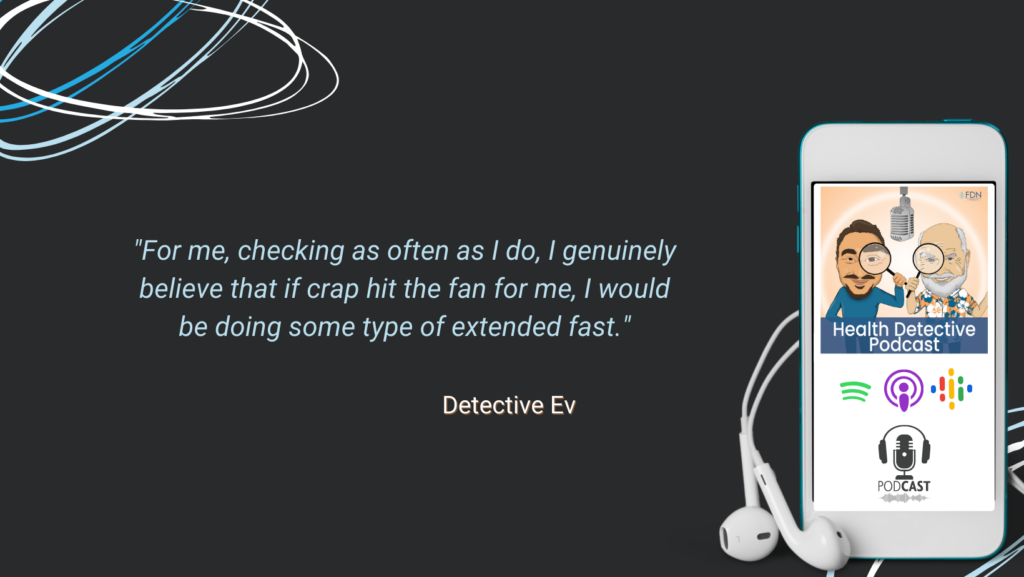
For me, checking as often as I do, I genuinely believe that if crap hit the fan for me, I would be doing some type of extended fast. I would reduce all of the other stress in my life, I would ask family members for some help, and I would go and do that and let the body do what it can do.
Intermittent Fasting: Muscle Building Benefits?
But from that HGH perspective, clearly for men, one of the reasons that they would be interested in that is muscle preservation or even muscle building. I think that’s something worth talking to you about because I’m sure many people that are 45-year-old men, want to actually either build or maintain.
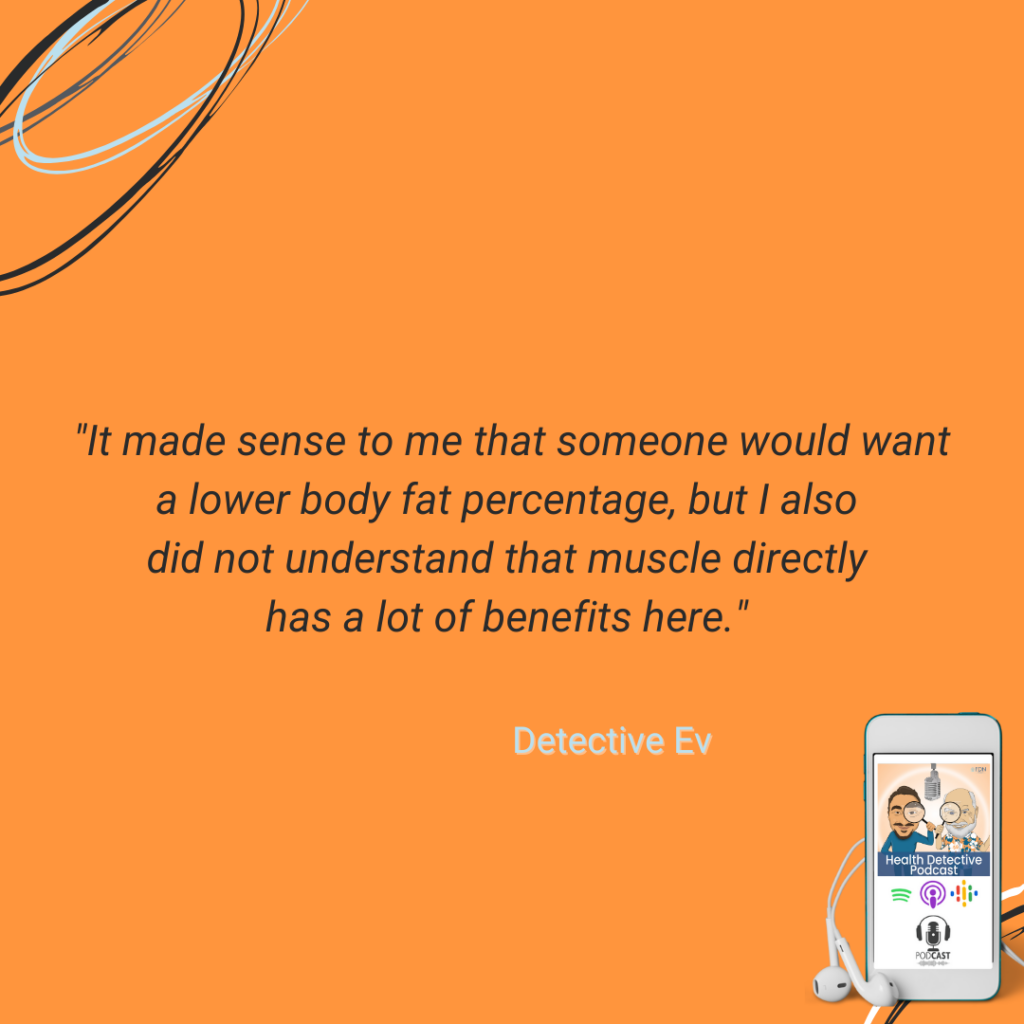
You also talked about the importance of maintaining muscle throughout one’s life. That’s something that I underestimated. First of all, I was not aware at all the studies on the longevity factors with muscle. It made sense to me that someone would want a lower body fat percentage, but I also did not understand that muscle directly has a lot of benefits here.
How do you approach that with clients? I’m sure you don’t necessarily want a 50-year-old guy going and doing a one rep squat, like the 17-year-olds do that I know in the local YMCA. But there are healthy ways to have low risk and high reward in terms of muscle building. So how do you approach that?
[00:30:42] Brian Gryn: That’s a good question. It’s sort of this balance act. Because as you get older, you’ll see this, Evan. And I’m dealing with this a little bit myself cause I’m an avid golfer and I’m feeling my right hip is bothering me. You’re just more aware and you don’t want to get injured.
Honestly, all the men and even women as they get older, we just want to be active, but we don’t want to get injured. Because we know that if we get hurt then we’re on the sideline, like you mentioned earlier, for months. That could just lead to bad habits.
Muscle Mass Decrease
I think first and foremost, one of the things that I’ve implemented into my program is more resistance bands, more variable resistance. There’s a few systems out there, one called the X3 Bar. I’ve had, Dr. Jaquish on a few times and he’s a bit outspoken about all this. But variable resistance can be beneficial in the sense that it’s easier on your joints.
I’m not going to go into a whole explanation of that, but I think finding different ways to make it adaptable for you as you get older. Also, I know you can just still build muscle doing 15, 20 reps. Yes, you’re building some endurance in there as well, but you can build strength too.
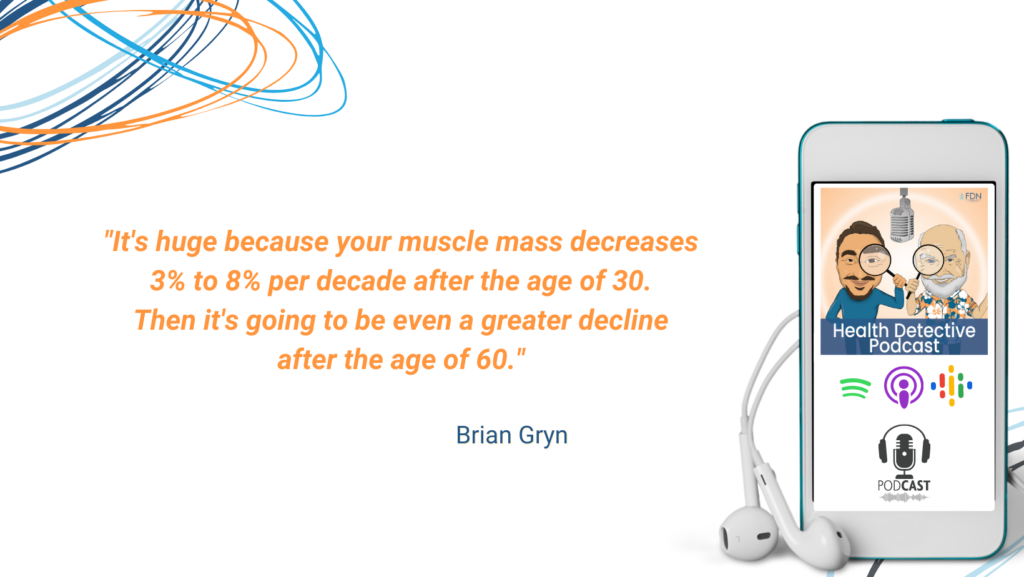
So, doing the two to five rep range is probably not great for someone that’s 65, 70 years old, right? Things like that, making tweaks lifestyle-wise when it comes to lifting, doing some variable resistance with resistance bands. The X3 is one example. It’s huge because your muscle mass decreases 3% to 8% per decade after the age of 30. Then it’s going to be even a greater decline after the age of 60.
[00:32:03] Detective Ev: I know that that’s at least somewhat preventable doing what we’re doing, or at least you can prolong it. That’s pretty well documented.
What’s also interesting too, and this is something I found somewhat recently. I’m not surprised, I guess, but I didn’t know this, that one of the biggest things for cognitive function long term is actually exercise.
Intermittent Fasting: Exercise and Mental Fitness
Who I was listening to was contrasting this to like the mental games that they put on apps or online and they say it’s like mental fitness stuff. He was talking about how they’ve been studying this for decades and there’s never been one of these games that’s been shown to actually increase your cognitive function. Yet, ironically, an hour of moderate to high intensity exercise is the thing that actually helps you most long term with that.

This is not only great for just your strength and your body, I mean, it’s great for your cognitive longevity too. You kind of wonder, well, if your physical health is good and your mental and cognitive health is good, I mean, that is prolonging aging. Like what else is aging? It’s the loss of those two things to a degree until the point that you really can’t hold on anymore.
So, this is one of the best things that someone could possibly do, and we already have a bunch of good research about it. There’s a million different ways to do it. You know, you could argue that some are more efficient and that’s fine, but we both agreed in this, in the beginning of the conversation.
If I go for the next 28 years to that 55-year-old person I’m picturing at the gym, and I am even half consistent with a half-decent program, I probably would look like that guy because I’ve been training for 28 freaking years. You know what I mean? I’m just getting a compound effect. Maybe he would’ve gotten it in 20, but like, I mean at this point we’re splitting hairs. Who cares? Right? You got to that point. So, just find something that you’ll like and enjoy, right?
Intermittent Fasting: Find an Exercise You Enjoy
I play pickleball with a lot of people double my age. It’s a huge thing. I’m kind of surprised cause that one seems like it could be quite prone to injury. You’re running around for stuff, but they seem to love it. We have 70-year-olds that play with us, no problem. Just find something that you love.
When I hear people that are exercising and going to the gym and they’re like, oh, I hate it, but I do it anyway. I’m like, Dude. Do you know there’s like hundreds of different forms of physical activity?
I’m not disciplined with this. I love going, right? I would assume that you love the things you’re doing too.
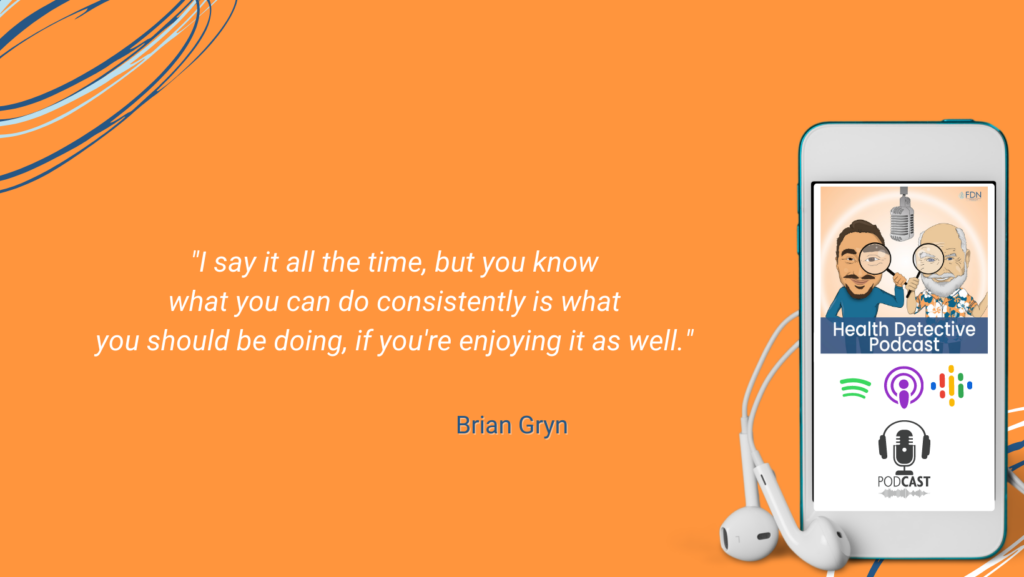
[00:34:02] Brian Gryn: Yeah, I think that’s a great point. I say it all the time, but you know what you can do consistently is what you should be doing, if you’re enjoying it as well. I mean, I’ve never been a big runner, like you mentioned, you run. Like, I just run a little bit sometimes with my wife, but that’s it.
My sort of cardio or high intensity exercise has come more from Mo Thai, kickboxing, doing things like that. And I’m still doing that. I’m still hitting pads and doing stuff and I’m in my forties. So, it’s something that you can continue to do as you get older.
Like you said, I think doing something that you enjoy. If you dread the gym, you could find a way to do something else, I’m sure, that you enjoy.
Intermittent Fasting: Frequency Increased, Length Decreased
[00:34:35] Detective Ev: I actually was thinking about this earlier and I’m kind of interjecting it here cause I don’t want to forget. We do have some people listening that are, I mean, they’re plenty young. They’re in their twenties. It’s not the bulk of our audience, but we know that they exist here for us. I’m sure as this gets bigger and bigger, that’s only going to be more true.
So, I have to ask, even just selfishly if for no other reason, what would your advice be knowing what you know now to Brian in his twenties, in terms of like being able to maintain things long-term and be as healthy as possible?
[00:35:04] Brian Gryn: Oh, so you’re maintain like muscle, like things like that?
[00:35:09] Detective Ev: Athleticism, strength, the ability to move and just do things.
[00:35:13] Brian Gryn: Well, you’ve said it a few times. I think it takes being consistent, week in, week out.
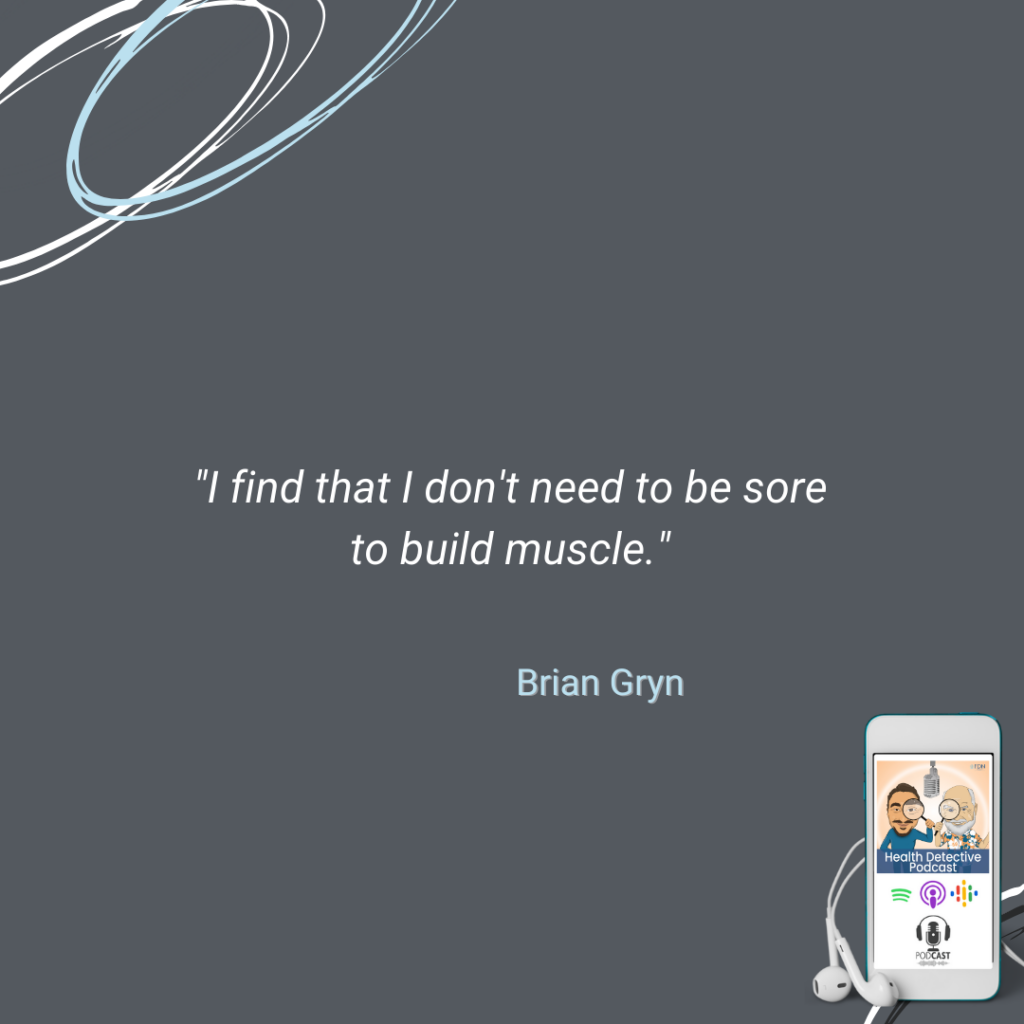
Also, one thing that I’d sort of changed over the last, I’d say five to seven years, is the frequency of my workouts has actually increased and the length of the workout has decreased. I find that I don’t need to be sore to build muscle. I know that’s true cause I take DEXA scans and I’ve been doing a lot of more resistance bands. I’m like, oh I’m not sore and I can keep coming back. I think that’s important.
Maybe when you’re younger you’re like, oh, if I’m not sore, it’s not a good workout, I’m not going to build muscle. Well actually you can do more harm than good sometimes if you’re out for those three, four days cause you can’t get off the toilet.
Intermittent Fasting: Creating Longevity
For example, if I do lower body, I’ll add it in, instead of doing it once a week, I do it twice a week. But my workouts are a little bit shorter. They still have intensity and I’m still pushing myself. But I recover faster, and I find that I come back even stronger the next time.
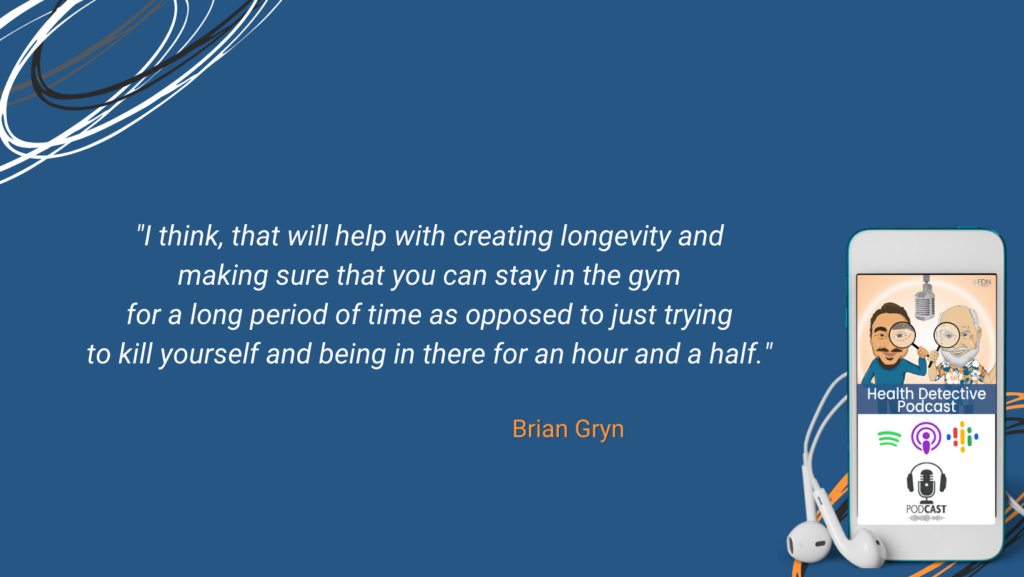
I think, that will help with creating longevity and making sure that you can stay in the gym for a long period of time as opposed to just trying to kill yourself and being in there for an hour and a half. I think that’s unnecessary. You can get a good workout in a half hour and be done and then come back a few days later and do the same thing.
[00:36:31] Detective Ev: Cool. We are kind of bringing this all together over the last nine minutes and wrapping it up. One thing I wanted to address again is directly what you offer, because I know that you have a book that I don’t think we talked about yet. Also, you kind of have this name as the Fat Burner Blueprint program.
So, if people are listening today, I’m assuming what would be happening is one of two things. Either one, our small-ish percentage of men that listen to this are super happy that we’re finally having a conversation around older men’s health. Or two, the wives are listening and thinking, okay, wait a second. I could probably get them to listen to Brian, but they’re not listening to me.
So, what do you offer? What can someone get from the book? What can someone get from your program? What would it look like to work with you, I guess is what I’m trying to say?
Intermittent Fasting: Where to Find Brian Gryn
[00:37:12] Brian Gryn: Yeah. Thank you. The program, Fat Burner Blueprint is explained in my book.
I sort of created the book to go through the program. The book’s not out yet. It’s probably going to be out in the next month, I’d say. I keep saying that, but it’s getting there. You know how books go. But it’ll be a nice thorough book on my program. The program itself is like we’ve talked a little bit about, it’s like a six-step system based on six months. We just go through each step and make sure that we’re not missing anything.
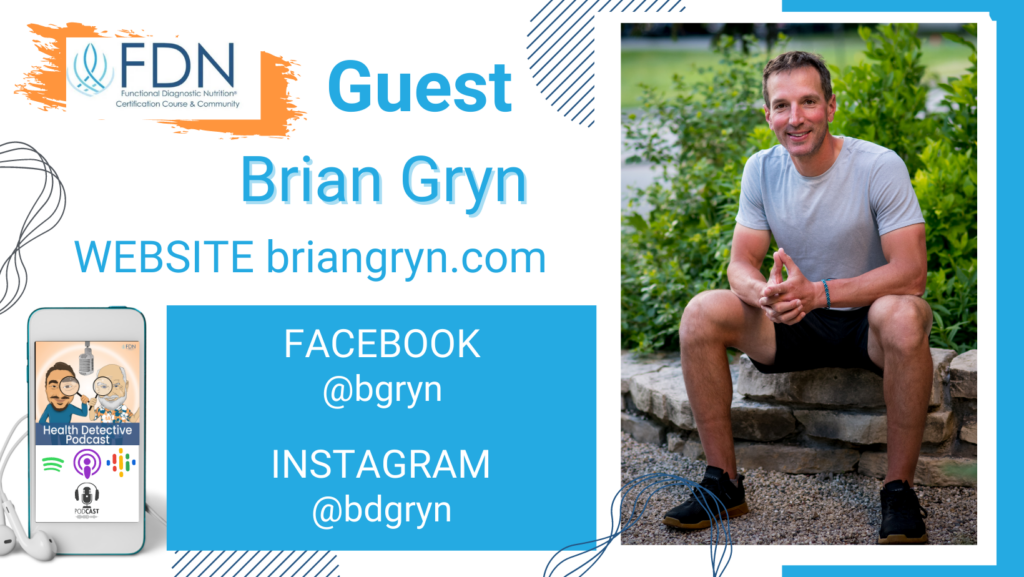
Essentially someone can learn about it just from reaching out. I have a lot of people reach out. You could just go on my website, briangryn.com and we can have a chat, 10 to 15-minute chat just to see if it’s right for you.
But yeah, like you said, if the women are listening and they think it’s right for their husband or significant other, it’s always good to have a third party to come in there and talk and give guidance as opposed to you trying to. We know how that works when you try to help a family member, doesn’t always work the way we want it to work.
My Blueprint is based around creating clarity, creating small changes right off the bat, activity upgrade, wrap our arms around stress management, sleep, and nutrition.
[00:38:19] Detective Ev: Very cool. Of course, we’ll have your links in like the podcast, in the show notes.
That could be something that the wives do as well, or significant others. Just grab the episodes that you like, send them over to the husband.
Resonating with the Guys on Health
You remind me very much of Matt in the sense that when I see you guys, you come across as like, standard dudes. Totally cool, normal guys. Then you’re able to actually relate to these men a little bit more.
The problem is, honestly, for myself in person, I come across as so eccentric and nerdy. I don’t have a problem with that. I’m happy with who I am, right? But there’s a disconnect.
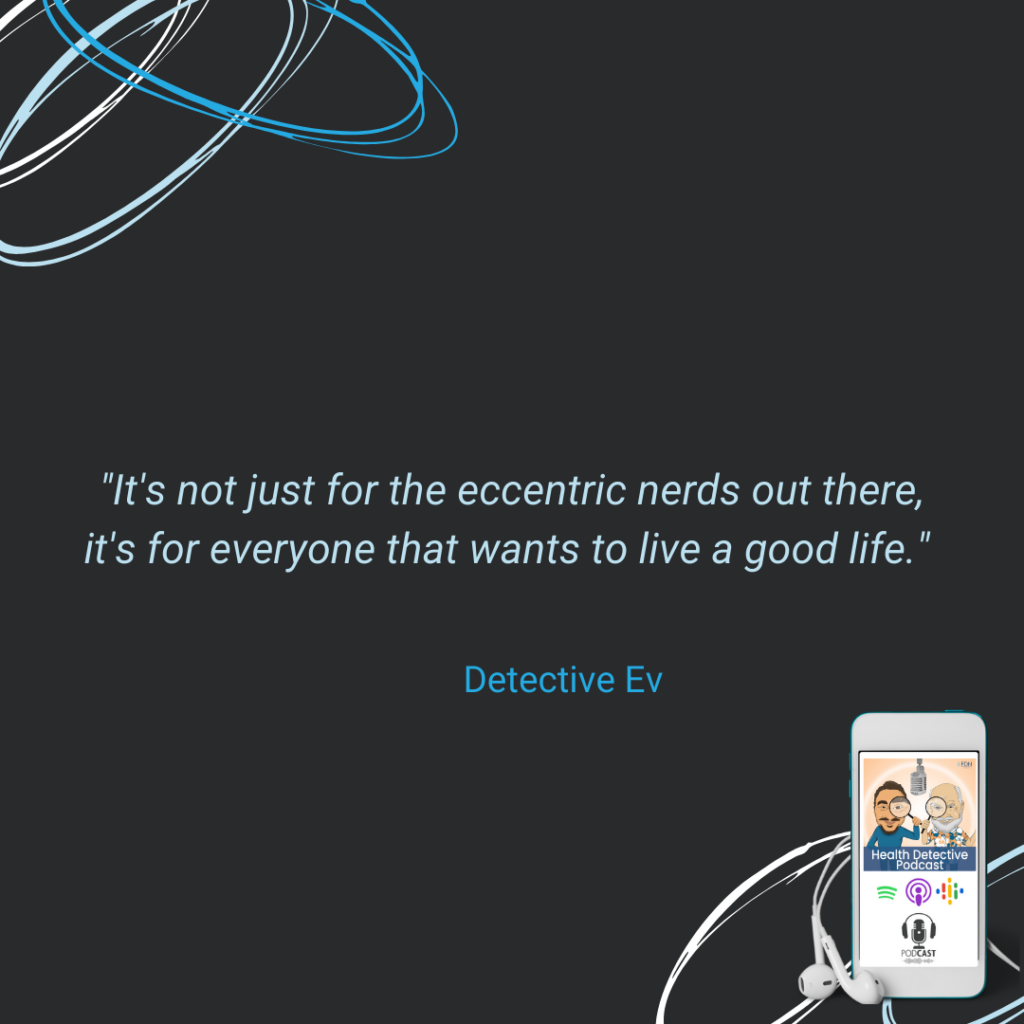
I’m not the guy who’s watching football. I couldn’t tell you who our quarterback is for my team, the Eagles. Apparently, they’re doing pretty well this year. Like, I don’t even know who the quarterback is. So, I have a disconnect with these guys. And I don’t know you that well, but I feel like you or Matt can talk these languages a little better and then let them know it’s also important to take care of your health. It’s not just for the eccentric nerds out there, it’s for everyone that wants to live a good life. So that could be something that resonates with them a lot more.
In terms of client stuff, I’m not asking you to give your secret sauce away, but I think it does help people to kind of know, like if I was going to pursue you as a coach and I wanted to work with you one-on-one, what does that look like? Do we hop on weekly calls? Do I have extra support, or is it kind of a little more back off? Like, I’d love to know what that might look like from an outline standpoint.
Implementing Tests and DEXA Scans
[00:39:30] Brian Gryn: It is weekly calls.
Initially, the first call is probably a little bit longer. We just go through your history, like what your habits have been like over the last year, two years, five years. Try to get a feel for that. Then, we do some baseline testing and that’s part of the reason I wanted to get FDN a little bit more. Cause I did notice that there’s a lot of great tests that you can come from that.
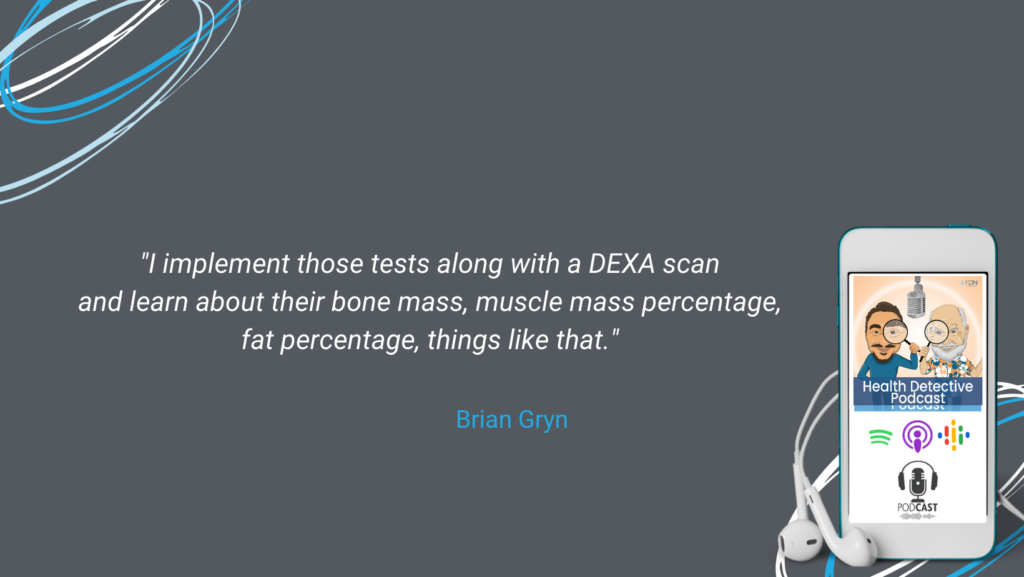
I implement those tests along with a DEXA scan and learn about their bone mass, muscle mass percentage, fat percentage, things like that. So yeah, we start with sort of this baseline of what you’ve done, what your habits have been like. Then where you’re at right now, and then obviously where you want to go and really focus around, okay, what’s your why? What’s really going to drive you through?
Because like we all know it’s not a linear sort of progression. There’s ups and downs and there’s plateaus. But that’s what the coach is for, sort of to get you through those times. That’s what we would initially do. Then we do weekly calls like you mentioned.
[00:40:20] Detective Ev: Awesome. I love this. Are there any social media handles that we haven’t shouted out yet?
[00:40:24] Brian Gryn: I’m on Instagram @bdgryn. On my website, briangryn.com, all my social media’s on there. I’m on LinkedIn and Facebook and things like that as well.
Has the FDN Course Met Expectations?
[00:40:31] Detective Ev: I will sneak one FDN question out of you since I have a few minutes here. I gotta ask, because I know you’re only a month in, so this is tough. But I always want people to answer this honestly. Of course, be polite. But still, we want honest answers. I don’t want someone just being nice cause they’re on the podcast.
So far in what you’ve done in the month, would you say the program, based on what you expected it to be, has exceeded, met, or maybe didn’t match up to the expectations that you had before starting it?
[00:40:59] Brian Gryn: I would say it’s met my expectations. I try to do a little bit every day, whether that’s 10 minutes or 30 minutes. But I do like that there’s not like a two-hour lecture, there’s a 30-minute lecture, a 20-minute lecture. Cause we know you can lose your attention span quick even though it’s something I’m intrigued about.

I like the way it’s formatted, and so far, so good. I’ve been just doing a little bit every day.
[00:41:20] Detective Ev: Yeah, probably a little premature to ask the deeper questions about FDN. But it’s exciting. I hope that you have a fun time with it.
My girlfriend Maddy, she is going through her practicals right now, so she’s about to graduate. My best friend is going through his practicals. Do not ask how I pulled off both these people at the same time. This is a miracle after six years that I have two really important people in my life doing this. Then his girlfriend is actually going through, but she started a little later than them. She’s grinding it out, just started a little later.
People Care About Their Health
It’s just exciting. I love when people are going through this. I love that people are still doing it even at a time that a lot of people are scared about and considering tough. I think this is a really great opportunity still.
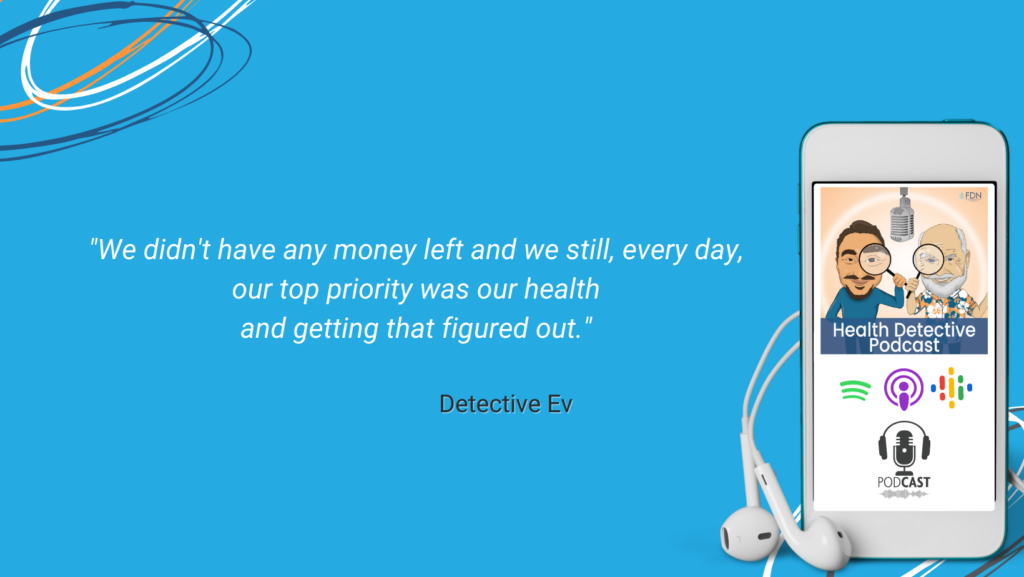
People care about their health. I can speak for at least myself and people like my mom, long before there was economic worry and people are really thinking about this more. We didn’t have any money left and we still, every day, our top priority was our health and getting that figured out.
Because it’s hard to make money, first of all, and do normal jobs when you are chronically ill. That kind of sucks. Then there’s just the general idea of many people do understand that their time here is limited, and we don’t want to be spending 20 years of it not feeling good or being super overweight or not moving the way that we used to.
Or if you’re a man that’s aging in today’s world, I’m assuming, if you don’t take care of yourself like you do, they’re probably having other issues that they’re not too thrilled about that maybe they weren’t having at 18. There’s good marketing right there. That’s all you gotta say, and then all of a sudden, they’ll do any lab that you want.
But seriously though, we don’t want to fall apart. We really don’t have to; we can age gracefully. How we can do that is using things like this. It’s always going to be in demand. I’m not worried about this at all. In fact, I’m putting more of my time into this now knowing that the economy’s getting a little crazy.
Signature Podcast Question – Daily Walks
Brian, I want to finish up with our signature question on this show. It’s a little different than what I said before when I was asking you to target specifically advice for like 20 somethings. The question I’d like to finish up on is if we could give you a magic wand and you could wave it and get every single person in this world to do one thing for their health, whether that is you literally get them to do one thing or maybe you stop getting them to do one thing, what is the one thing that Brian would get them to do?
[00:43:21] Brian Gryn: Oh my God. It’s funny cause I asked one question on my podcast at the end too. So, what would be the one thing I either stop them from doing or get them to do?

Okay. So, I would get them doing daily walks. It seems so simple, but I feel like it has such a big lever on health. You know, it gets you in the sun, gets you outside in nature, maybe away from your phone, and can help with mood, can help with bone density and even cardio health.
It just is one of those things that you think it’s simple and it’s not a big deal, but it actually can create this cascading of health effects that can just lead you down a great road. So yeah, I would say going for daily walks.
Conclusion
[00:44:09] Detective Ev: Excellent. Brian, thank you so much for coming on.
Again, guys, you can find all his links in the show notes. And ladies, this might be what you’ve been waiting for, for 200 episodes. It really could be the time. So, thank you man.
Brian Gryn: Thanks so much, Evan.
You can always visit us at functionaldiagnosticnutrition.com.
To hire an FDN practitioner, go to fdnthrive.com.
For a FREE Health Review, go to fdnthrive.com/match/.

